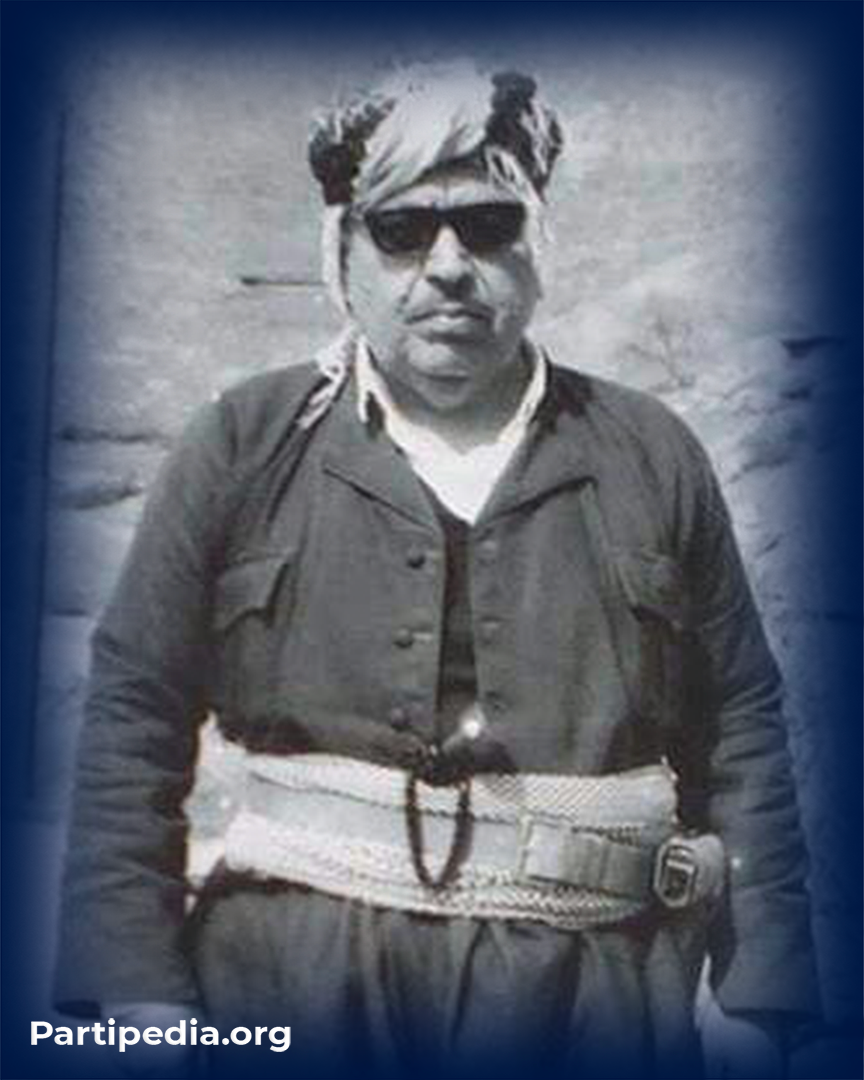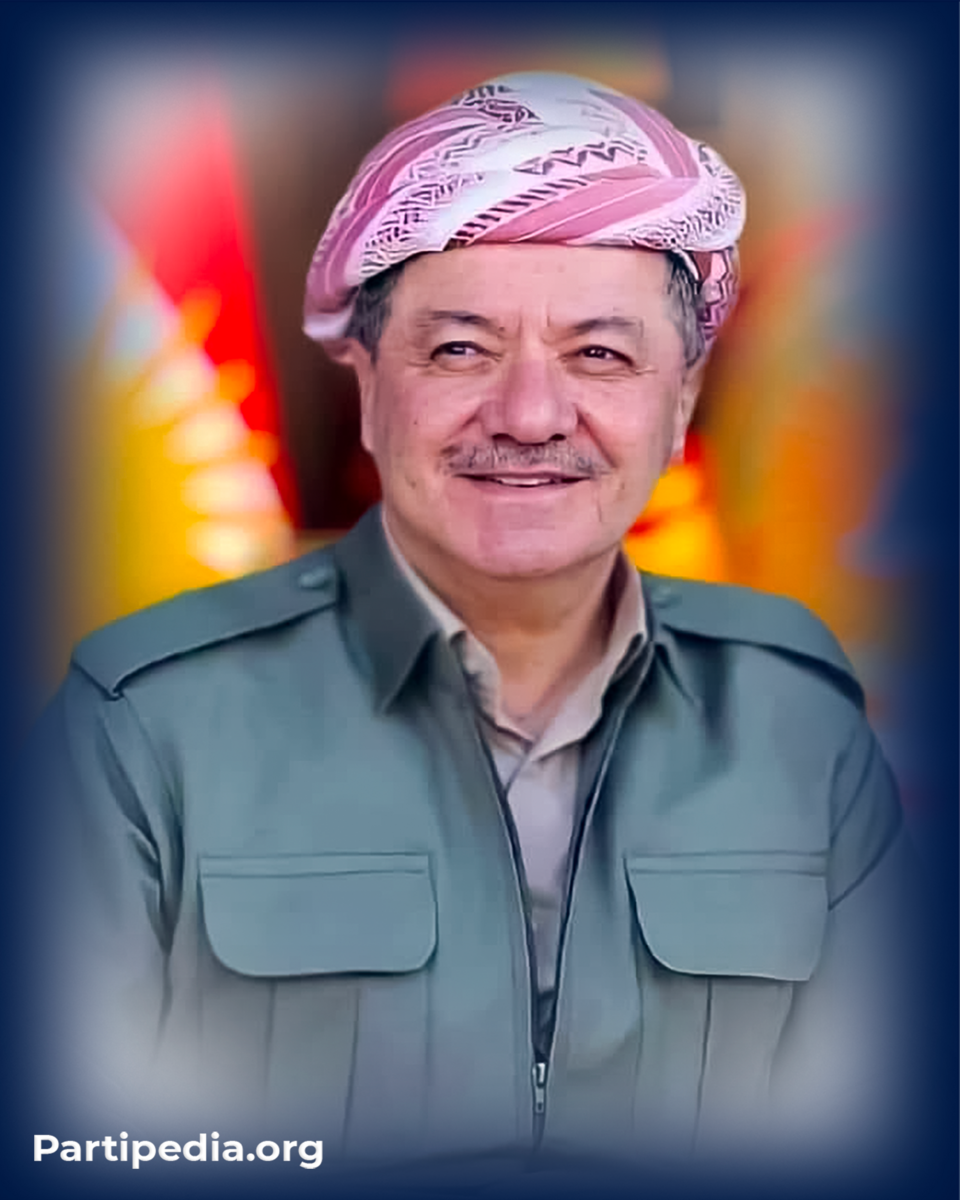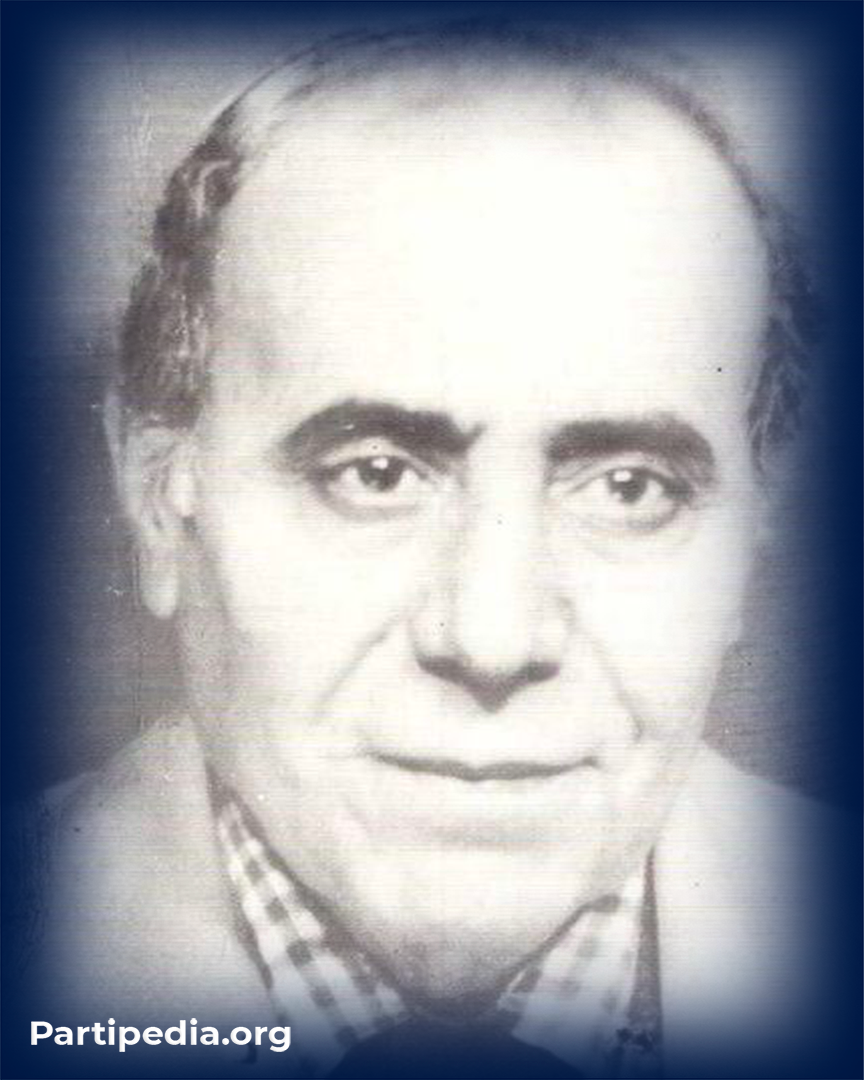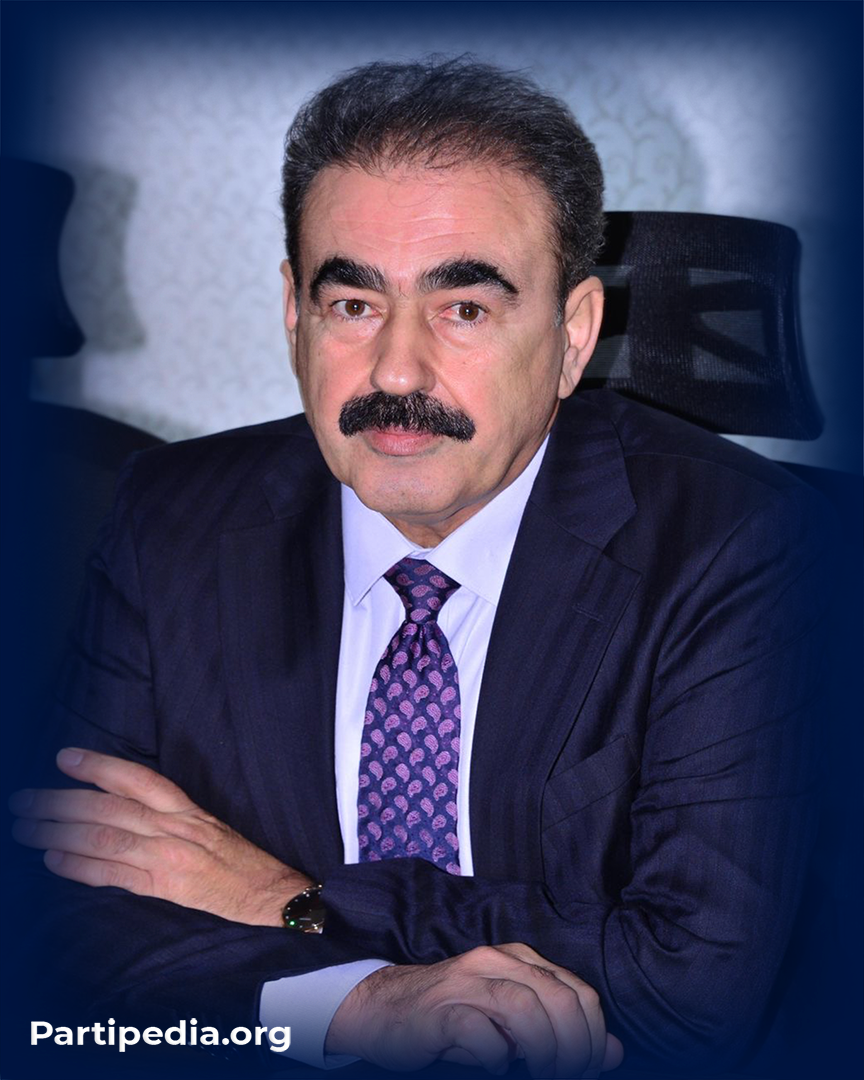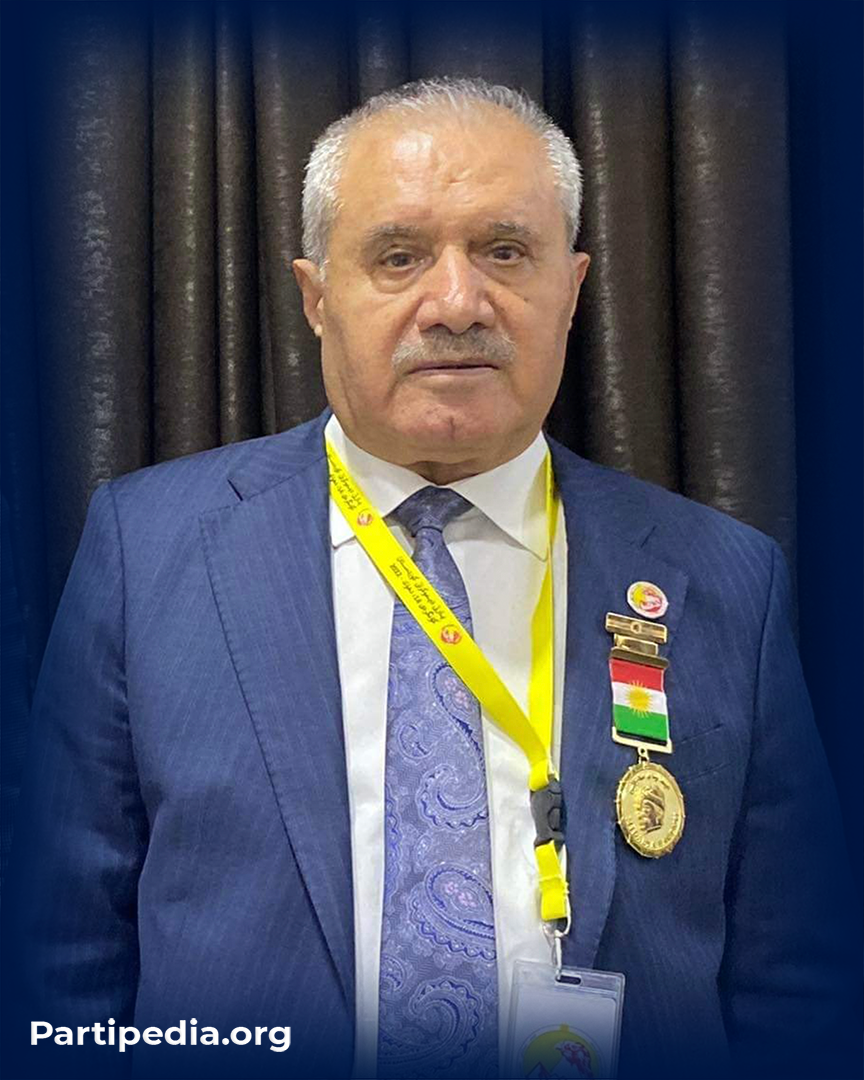Mohammed Ziad Hama Mahmoud, also known as Kaka Ziad Koya, supported the First Barzani Revolution in 1931. He supported the Second Barzani Revolution from 1943 to 1945. In 1946, he became the second deputy leader of the Kurdish Democratic Party (KDP) at the first congress. On June 9, 1963, he joined the ranks of the Peshmerga forces.
Biography
Mohammed Ziad Hama Mahmoud, also known as Kaka Zadi Koya, was born in 1914 in Koya, Erbil province, to a Ghafouri family. He was taught Kurdish, Arabic, and English by Zaki Ahmad Hanaray. He sent his daughters to school, which was not common at the time. He was exiled to Iran in 1975 after the collapse of the September Revolution. In 1976, he returned to South Kurdistan and was expelled to Baghdad by the authorities of the Ba'athist Arab Socialist Party. In 1983, he helped the Barzani family in Baghdad, whose men were missing. In 1990, he returned to Koya. In 1991, he moved to the Islamic Republic of Iran during the revolution. He died on 12 April 1991 in Naghdeh, East Kurdistan, and he was buried on 25 August 1991 in the Kakon cemetery in Koya. He was fluent in Kurdish, Arabic, Persian, and English.
Mohammed’s Striving Record
He supported the first Barzani revolution in 1931. He graduated from the fifth grade of primary school. In 1933, he was one of the founders of the Youth Association in Koya, which was known as the Manwaran Association. In 1939, he joined the ranks of the Kurdish Hiwa Party. In mid-April 1941, during the opposition of Iraqi Prime Minister Rashid Ali Geylani to the British authorities, he was a member of the Kurdish delegation from Erbil and Kirkuk to Baghdad to visit Rashid Ali Geylani and he delivered a speech. In 1943, he was elected as a member of the Iraqi Parliament by the voters of Koya. He supported the Second Barzani Revolution from 1943 to 1945. He was a member and supporter of the Kurdistan Revival Society. In 1943, he supported the Kurdish Victory Club in Baghdad. In 1945, he joined the Kurdish Liberation Party. In 1945, he provided financial assistance to the Communist Party in Iraqi Kurdistan (Revolutionary Party) to publish their publications.
On December 16, 1945, he was expelled to Shaqlawa town in Erbil province on charges of supporting the Second Barzan Revolution (1943-1945). He was in police custody for a year. In 1945, he collected letters to help the Kurdish Revival Society (ZK) in Koya town and provided financial assistance to them. In 1945, he provided financial assistance to the Kurdistan Democratic Republic. In 1946, he bought a house in Baghdad, which was used as a free dormitory for Kurdish students. In 1946, he became the second deputy leader of the KDP. In 1946, Kurds from the south who had served in the Kurdistan Democratic Republic and were returning home were given shelter by him and sent to their places.
In 1947, he gave shelter to many cadres of the KDP who had fled from the oppression of the Iranian authorities, namely Sadiq Haideri. He was elected to the Iraqi parliament in 1947 and was active in the opposition front in the parliament and constantly supported the Barzani prisoners and exiles. In 1948, under the “freedom to the Barzani prisoners” motto, he participated in the demonstration in Baghdad against the signing of the Treaty of Portsmouth between the United Kingdom and the Kingdom of Iraq. In 1950, he presided over the Koya Conference and elected a new leadership to run the Kurdish Democratic Party thus, he fulfilled his party duties and rank affairs assigned to him at the first congress of the Kurdish Democratic Party.
Until 1951, when the Jews of Koya were forcibly deported to the Republic of Israel by the Iraqi government, he was known to support the Jews. He was a member of the Iraqi Peace Movement. He was briefly imprisoned by the Iraqi authorities in 1953. In 1955, he helped the Iraqi Communist Party to send a Kurdish delegate to the World Congress of Students and Youth in Warsaw. In early 1959, he was a member of the National Front Committee in Koya, Erbil in order to resolve the problems between the KDP and the Iraqi Communist Party in Koya. In 1957, he paid for the trip of Jalal Hisamuddin Nureddin (1933- 2017) also known as Jalal Talabani, to Moscow to meet President Mustafa Barzani (1903-1979). On July 26, 1958, he met with several personalities in Koya town to go to Baghdad and prepare for the demands of the Kurdish nation. On July 27, 1958, he visited the Iraqi Ministry of Defense in Baghdad with a delegation of Kurds to offer congratulations to Abdul Karim Qasim (1914 - 1963) on the fall of the monarchy.
In 1959, the fourth Congress of the KDP was held in his house in Baghdad. On June 2, 1959, most of his land and property were confiscated by the signature of Lieutenant Colonel Abdulkarim Qasim, chairman of the High Commission for Agricultural Reform. On December 22, 1960, he was appointed as a member of the council of the tobacco monopoly office. In 1960, he was a delegate to the fifth Congress of the KDP. On September 16, 1961, he was arrested in Erbil, Baghdad, and taken to Kut prisons, and his house was destroyed. He was released in 1963 after the fall of Abdulkarim Qasim's regime. On June 9, 1963, he joined the ranks of the Peshmerga forces. In 1963, he was a delegate to the First People's Congress (Koya Congress). In 1963, he hosted President Mustafa Barzani during the First People's Congress (Koya Congress). In mid-1963, his house was burned down by the National Guard forces of the Ba'athist Arab Party. In 1964, he tried to reconcile the presidential wing and the political bureau wing. In 1964, he participated in the Second People's Congress (Qaladze Congress). In 1964, he became a member of the Revolutionary Leadership Council in Iraqi Kurdistan. In 1965, he played a major role in the granting of amnesty to the refugees from Hamadan by President Mustafa Barzani. In 1966, he was a delegate to the 7th Congress of the KDP in Galala village of Erbil province. In 1980, he was a delegate to the 8th Congress of the KDP in Nawprdani village of Erbil province.
Sources:
-
محمود شیخ سین حسو الریكاني، شنگال (سنجار) في العهد الملكي ١٩٢١ ـ ١٩٥٨، (أربیل ـ الأكادیمیة الكوردیة ـ مطبعة الحاج هاشم ـ ٢٠١٢م)، ص ١١٧.
-
ئهحمهد باوهڕ، كۆمهڵێ یانهی سهركهوتن، (كوردستان ـ شارهوانی كهلار ـ چاپخانهی ئۆفسێتی تیشك ـ ٢٠٠٤ز)، ل ١٣٣.
-
ئامادهكردنی : سدیق ساڵح، عهبدوڵڵای سۆفی كهریمی سهڕاجی، سهربازێكی ون له تاكه كۆمارهكهی كوردستاندا، (سلێمانی ـ چاپخانهی بهدرخان ـ ٢٠٠٣ز)، ل ل ١٤٠ ـ ١٤١.
-
هۆشیار نوری لهك، ناودارانی كورد له دێڕێكدا، (ههولێر ـ چاپخانهی چوارچرا ـ ٢٠١٠ز)، ل ١٣.
-
اسماعیل شوكر رهسول، كهركوك لێكۆڵینهوهیهكی مێژووییه له رووی رامیاری و بیری ١٩٣٩ ـ ١٩٤٥، (ههولێر ـ ٢٠٠٧ز)، ل ٧٣.
-
فاضل رسول، كردستان والسیاسة السوفیتیة في الشرق الأوسط، ترجمة غسان نعمان، (السلیمانیة ـ مكتب الفكر والوعي في الأتحاد الوطني الكردستاني ـ مطبعة مؤسسة حمدي للطباعة والنشر ـ ٢٠٠٨م)، ص ٢٤١.
-
ئامادهكردن : پێشڕهو ئهحمهد، له یادی كاكهزیادی كۆیهدا، ڕۆژنامهی كوردستانی نوێ، ئۆرگانی یهكێتیی نیشتمانیی كوردستان، ژماره ٢٤٢٥، ساڵی دهههم، سلێمانی، پێنجشهمه، ١٢ نیسانی ٢٠٠١ز، ل ١٠.
-
دهقی وتار مام جهلال له مهراسیمی یادی ١٠ ساڵی شههید سهركرده عومهر دهبابهدا، ڕۆژنامهی كوردستانی نوێ، ئۆرگانی یهكێتیی نیشتمانیی كوردستان، ژماره ٢٦٧١، ساڵی یانزهههم، سلێمانی، چوارشهمه، ٣٠ كانونی دووهمی ٢٠٠٢ز، ل ٣.
-
رێبواری رێگای تهبایی گهل ریزهكانی گهل، ڕۆژنامهی كوردستانی نوێ، ئۆرگانی یهكێتیی نیشتمانیی كوردستان، ژماره ٢٦٧٠، ساڵی یانزهههم، سلێمانی، سێشهمه، ٢١ كانونی دووهمی ٢٠٠٢ز، ل ٦.
-
دیمانه : ڕازاو ڕهزبهر، دووره پهرێزی دكتۆر پیرۆز، گۆڤاری شاووشكا، سهنتهری شاووشكا بۆ چالاكی ڕۆشنبیری، ژماره ١١، ههولێر، پایزی ٢٠٠٤ز، ل ١٩.
-
ئهحمهد بانیخێڵانی، بیرهوهرییهكانم، (ئستكهوڵم ـ ١٩٩٧ز)، ل ل ١٧٨، ٢١٧، ٣٩٩.
-
كریس كوچرا، جنبش ملی كرد، ترجمهی ابراهیم یونسی، چاپ دوم، (تهران ـ موسسه انتشارات نگاه ـ ١٣٧٧ھ . ش)، ص ٢٣٨.
-
مههدی محهمهد قادر، پێشهاته سیاسییهكانی كوردستانی عێراق ١٩٤٥ ـ ١٩٥٨، (سلێمانی ـ سهنتهری لێكۆڵینهوهی ستراتیجیی كوردستان ـ ٢٠٠٥ز)، ل ل ٩٣، ١١٩ ـ ١٢١، ١٢٣، ١٢٨.
-
شوان محهمهدئهمین تهها خۆشناو، ههولێر له نێوان ساڵانی ١٩٦٣ ـ ١٩٧٠ لێكۆڵینهوهیهكی مێژووییه له بارودۆخی سیاسی، (ههولێر ـ چاپخانهی زانكۆی سهڵاحهددین ـ ٢٠١٦ز)، ل ل ٣٦، ٧٦.
-
عهبدوڕەحمان شهڕەفكهندی، چێشتی مجێور، (پاریس ـ ١٩٩٧ز)، ل ٤٤٤.
-
دیڤید مكدول، تاریخ الأكراد الحدیث، (بیروت ـ دار الفارابي ـ ٢٠٠٤م)، ص ٤٤٩.
-
جهمال نهبهز، بیرهوهریینامهی ئهو رۆژانهی جارهكی دیی ناگهڕێنهوه، (سلێمانی ـ چاپخانهی شڤان ـ ٢٠١٧ز)، ل ٢١٥.
-
قرار صادر من الهیئة العلیا للاصلاح الزراعي بأسماء من تقرر خضوعهم للقانون، جریدة الوقائع العراقیة، العدد ١٨٢، السنة الاولی، وزارة الأرشاد في العراق، بغداد، مطبعة الحكومة، الأثنین، ٨ حزیران ١٩٥٩م، ص ٤.
-
جهمال بابان، سلێمانی شاره گهشاوهكهم، بهرگی سێیهم، چاپی دووهم، (ههولێر ـ دهزگای چاپ و بڵاوكردنهوهی ئاراس ـ چاپخانهی ئاراس ـ ٢٠١٢ز)، ل ٣٢٣.
-
بن بوزید أسماء، مصطفی البارزاني ودوره في النضال الكردي ١٩٤٣ ـ ١٩٧٥، الجمهوریة الجزائریة الدیمقراطیة الشعبیة، وزارة التعلیم العالي والبحث العلمي، جامعة محمد بوضیاف المسیلة، كلیة العلوم الأنسانیة والاجتماعیة، قسم التاریخ، ٢٠١٩م، ص ٣٨.
-
فرهاد عوني، انطباعات عن احتفاء ابناء كویسنجق بزیارة البارزاني الخالد لمدینتهم، الحلقة ١٠، مجلة گولان العربي، مؤسسة گولان الأعلامیة، العدد ١٨، أربیل، مطبعة وزارة الثقافة، ٢٥ تشرین الثاني ١٩٩٧م، ص ٤١.
-
حوسێنی حاجی قادر، كاكه زیادی حهمهغای گهورهی كۆیه بیرهوهریهك، گۆڤاری كهكۆن، ژماره ٢١، ئایاری ٢٠١٢ز، ل ل ١٠ ـ ١١.
-
فرهاد عوني، انطباعات عن احتفاء ابناء كویسنجق بزیارة البارزاني الخالد لمدینتهم، الحلقة ١٠، مجلة گولان العربي، مؤسسة گولان الأعلامیة، العدد ١٨، أربیل، مطبعة وزارة الثقافة، ٢٥ تشرین الثاني ١٩٩٧م، ص ٤١.
-
تۆفیقی مهلا سدیق، بیرهوهریهكانی ڕۆژانی حیزبایهتی و پێشمهرگایهتی و دوور خرانهوهم، چاپی دووهم، (ههولێر ـ چاپخانهی شههاب ـ ١٩٩٦ز)، ل ل ٦٠، ٨٨.
-
ئهحمهد دڵزار، بیرهوهری ڕۆژانی ژیانم، بهشی سێیهم، (ستۆكهوڵم ـ ١٩٩٤ز)، ل ١٢.
-
ئهحمهد دڵزار، بیرهوهری ڕۆژانی ژیانم، (ههولێر ـ وهزارهتی ڕۆشنبیری و لاوان ـ چاپخانهی شههاب ـ ٢٠١٩ز)، ل ١٩٠.
-
ب. ههوراز، كورته لێكۆڵینهوهیهك لهمهڕ دامهزراندن و ههڵوهشاندنهوهی حزبی شۆڕش و ڕزگاری له كوردستانی باشوور، (بێ شوێن ـ ئایاری ١٩٩٣ز)، ل ٢٧.
-
بهرزان ئهحمهد كورده، كورته مێژووی جوولهكهكانی كوردستان، (سلێمانی ـ چاپخانهی كارۆ ـ ٢٠١٩ز)، ل ١٩٠.
-
بهكر عهبدولكهریم حهوێزی، گهشتێك به كۆماری مههابادا بیرهوهریهكانم له ڕۆژههڵاتی كوردستاندا ١٩٤٤ ـ ١٩٤٧، (ههولێر ـ دهزگای چاپ و بڵاوكردنهوهی ئاراس ـ ٢٠٠١ز)، ل ل ٩ ـ ١٠.
-
جمال بابان، أعلام الكرد، الجزء الأول، الطبعة الثانیة، (أربیل ـ دار آراس للطباعة والنشر ـ ٢٠١٢م)، ص ص ٥٠٠ ـ ٥٠١.
-
جمال فتح الله طیب، هێرشی حهرهسی قهومی بۆ شاری كۆیه و دهوروبهری له ساڵی ١٩٦٣دا، گۆڤاری كهكۆن، ژماره ٣٩، سلێمانی، چاپخانهی ماردین، تشرینی دووهمی ٢٠١٥ز، ل ل ١٧، ١٩.
-
حبیب محمد كریم، تأریخ الحزب الدیمقراطي الكوردستاني ـ العراق (في محطات رئیسیة) ١٩٤٦ ـ ١٩٩٣، (دهوك ـ مطبعة خهبات ـ ١٩٩٨م)، ص ص ٣٤ ـ ٣٥، ٤٢.
-
فهرهاد عهونی، ٣٦ نامه و چهند كهسایهتییهكهی دیوانی من، (ههولێر ـ چاپخانهی زانكۆی سهڵاحهددین ـ ٢٠١٩ز)، ل ل ٥٤ ـ ٥٩.
-
روژین چلبی منیر، زاخۆ ١٤ی تیرمهها ١٩٥٨ ـ ٦ی ئادارا ١٩٧٥، (بێ شوێن ـ سهنتهرێ زاخۆ بۆ ڤهكۆلینێن كوردی ـ ٢٠١٨ز)، ل ٧٥.
-
محمد سهل طقوش، تاریخ الأكراد ٦٣٧ ـ ٢٠١٥، ( بیروت ـ دار النفائس للطباعة والنشر والتوزیع ـ ٢٠١٥م)، ص ٣٠١.
-
حهمهی فهرهج ههڵهبجهیی، له شنروێ وه بۆ ستكهۆڵم، چاپی سێیهم، (سلێمانی ـ چاپخانهی كارۆ ـ ٢٠١٥ز)، ل ١٥٣.
-
دیوید مك داول، تاریخ معاصر كرد، ترجمه ابراهیم یونسی، چاپ چهارم، (تهران ـ نشر پانیذ ـ چاپ دالاهو ـ ١٣٩٣ ھ.ش)، ص ٤٦١.
-
ڕەهبهر سهید برایم، پڕشنگهكانی كهكۆن، (ههولێر ـ چاپخانهی شههاب ـ ٢٠١٤ز)، ل ل ٣٢ ـ ٣٥.
-
سید علی موجانی، سولماز صدقی، الهه نعمتی ...، فرهنگ رجال و خاندانهای معاصر عراق، (تهران ـ نشر عظام ـ ١٣٩٢ ھ ش)، ص ١١٤٥.
-
شهعبان عهلی شهعبان، ههندێك زانیاری سیاسی و مێژوویی، چاپی سێیهم، (ههولێر ـ چاپخانهی ڕۆژههڵات ـ ٢٠١٣ز)، ل ١٠٢.
-
عبدالرزاق مطلك الفهد، الأحزاب السیاسیة في العراق ودورها في الحركة الوطنیة والقومیة ١٩٣٤ ـ ١٩٥٨، (بیروت ـ شركة المطبوعات للتوزیع والنشر ـ ٢٠١١م)، ص ٢٤٩.
-
العرب والكرد المصالح والمخاوف والمشتركات، سعد بشیر اسكندر، الثابت والمتغیر في الموقف القومي الكردي تجاه السلطة العربیة في بغداد خلال العهد الملكي ١٩٢١ ـ ١٩٥٨، (بیروت ـ المركز العربي للأبحاث ودراسة السیاسات ـ ٢٠١٩م)، ص ٩٧.
-
عهبدولخالق مهعروف، كۆیه ... ناودارانی، (ههولێر ـ چاپخانهی مناره ـ ٢٠١٤ز)، ل ل ٧٢ ـ ٧٦.
-
عوسمان مستهفا خۆشناو، لهگهڵ ڕۆژگاردا گهڵاوهریوهكان، (ههولێر ـ كۆمهڵگای چاپهمهنی شههاب ـ ٢٠٠٧ز)، ل ٧٣.
-
فاتح رسول، چهند لاپهڕهیهك له مێژووی خهباتی گهلی كوردمان، بهرگی یهكهم، (سوید ـ چاپخانهی ههڵهبجه ـ ١٩٧٩ز)، ل ل ٤٠٧ ـ ٤٠٩.
-
كریم شارهزا، المناضل الكوردي كاكه زیاد آغا غفوري ١٩١٤ ـ ١٩٩١، جریدة خهبات، لسان حال الحزب الدیمقراطي الكوردستاني ـ الموحد، العدد ٨٩٣. الجمعة، ٢٥ أیلول ١٩٩٨م، ص ١٣.
-
كهریم شارهزا، "له یادی نیشتمانپهروهراندا : كاكهزیاد ئاغای كوردپهروهری ئاشتیخواز"، ڕۆژنامهی برایهتی، ئۆرگانی پارتی دیموكراتی كوردستان ـ یهكگرتوو، ژماره ٢٠٨١، دوو شهمه، ٧تشرینی دووهمی ١٩٩٤ز، ل ٦.
-
كهریم شارهزا، كاكه زیاد له كاروانی خهباتی كوردایهتیهوه، ڕۆژنامهی برایهتی، ئۆرگانی پارتی دیموكراتی كوردستان ـ یهكگرتوو، ژماره ٢٣١٠، ههولێر، یهكشهمه، ١٣ نیسانی ١٩٩٧ز، ل ٦.
-
كهریم شارهزا، كاكه زیاد ئاغای غهفووری، ڕۆژنامهی برایهتی، ئۆرگانی پارتی دیموكراتی كوردستان، ژماره ٣٣٥٥، ههولێر، پێنجشهمه، ١٢ نیسانی ٢٠٠١ز، ل ٧.
-
محمد عامر دیرشهوي، البنیة الدینیة ـ السیاسیة في كوردستان، (أربیل ـ مطبعة هیڤي ـ ٢٠١٦م)، ص ص ٢٤٥، ٣١٧.
-
مرسوم جمهوري رقم ٧٣٩، جریدة الوقائع العراقیة، وزارة الارشاد في العراق، العدد ٤٦٧، السنة الثالثة، بغداد، الأثنین، ٩ كانون الثاني ١٩٦١م، ص ٤.
-
مسعود البارزاني، البارزاني والحركة التحرریة الكردیة، المجلد الأول، الطبعة الثانیة، (بیروت ـ كاوا للثقافة الكردیة ـ ١٩٩٧م)، ص ٢١٦ ـ ٢١٧.
-
مهولود ژاكاو، كاكه زیادی حهمهغا، گۆڤاری كهكۆن، ژماره ٥٥، سلێمانی، چاپخانهی بینایی، تشرینی یهكهمی ٢٠١٨ز، ل ٤٠.




